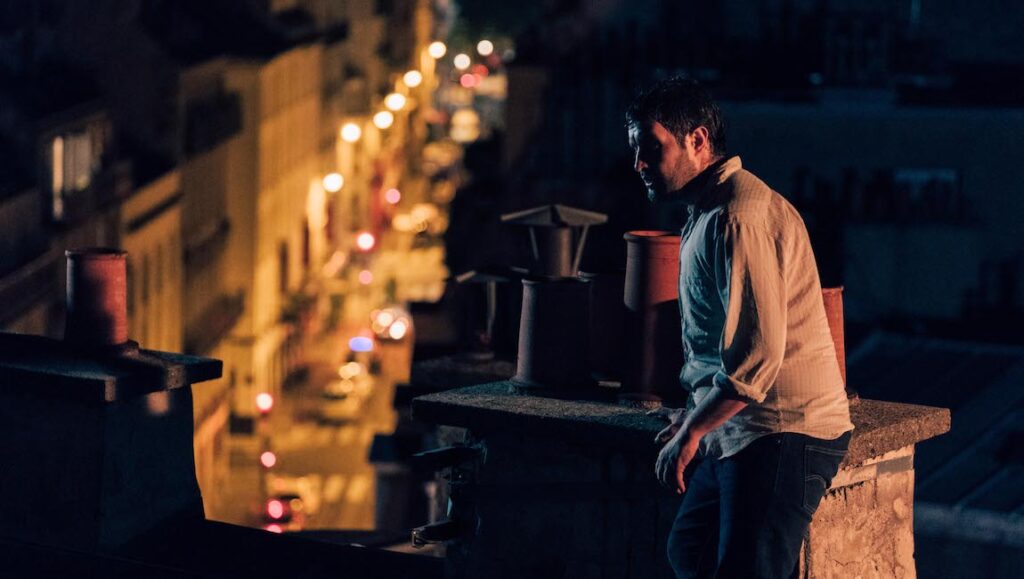There’s an elusive, ephemeral quality to Clement Cogitore’s Sons of Ramses, a sorta-thriller that unfolds like a half-remembered dream. It’s only his second feature, following 2015’s The Wakhan Front, but Cogitore is also an accomplished documentarian, video artist, and has even staged a full-scale opera. All of these disciplines inform the odd tenor of this newest project, a portrait of a charlatan psychic traversing the dark underbelly of a neighborhood haunted by the specters of the dispossessed. The psychic is Ramses, played with a hulking, somnambulist quality by the very good Karim Leklou. The film begins with a staged reading, as Ramses purports to reveal the words of the recently deceased to a grieving woman. But it’s all smoke and mirrors, an elaborate ruse that finds Ramses and his associates hacking into people’s phones and scrolling through their photos and social media to find details about their lives. Business is good, until a group of feral kids break into Ramses’ apartment and begin stealing stuff. Ramses assumes that they were sent by his rivals — apparently there are multiple psychics in the area, and they’ve cordoned off sections so that all can thrive. But Ramses ignores their entreaties to respect the old ways, and discovers that the kids are actually immigrants from Tangiers that have been abandoned to the streets. Cogitore spends much of the first half of the film establishing the neighborhood, the Goutte D’or area of Northern Paris. It’s a cloistered, if vibrant milieu, a series of back alleys, apartment high rises, and basements. There’s bustling street activity, but also a huge construction site that cuts through the area. After the street kids find that one of their own has gone missing, they accost Ramses and demand that he use his “powers” to locate their friend. Ramses plays along, fearing for his safety, and then has what can only be described as an actual vision. He finds the missing boy’s body at the construction site, removing it from a pile of rubble and placing it under a tarp.
From here on, Ramses and the boys are tethered together. While the boys risk becoming problematic racial caricatures, Cogitore eventually fleshes out their stories and humanizes them. Ramses, too, is given more depth, as we meet his father, a devout believer in the supernatural. It’s an interesting enough narrative, but what fascinates most is Cogitore’s approach to storytelling — just slightly off, a hint of abstraction that stretches traditional realism into something more fluid and opaque. Ramses’ vision is particularly strange; he is performing his act for a crowd, seems to notice something offscreen in his peripheral vision, and then a cut instantly places him at the construction site. It’s momentarily destabilizing, a fact commented upon by Ramses himself, suggesting the presence of something has actually ruptured the film’s diegesis. Later, a minor supporting character is revealed to actually be a set of twins who share a job and a uniform, essentially performing as each other at all times. This doesn’t add anything literal to the proceedings, but it is another blow to Ramses’ understanding of the world around him. The film isn’t successful as a thriller, although it eventually moves so far away from that particular form that it hardly matters. Instead, it becomes a halting, desperate grasping for profundity in an otherwise mundane, quotidian reality. Grace notes abound in Cogitore’s nighttime reverie. Working with cinematographer Sylvain Verdet, he finds a muted, hazy quality in the images; long, handheld tracking shots in the Dardenne brothers’ style are juxtaposed with quiet moments of introspection, closeups giving way to more expansive views of the area and its denizens. In a way, it reminds one of Leos Carax’s early work, or even Bertrand Bonello, not in terms of an exact influence but in the sense that we are witnessing a fully formed worldview that requires the viewer to tune in to its wavelength. Sons of Ramses feels major, a bold film announcing a vital voice. Let’s hope there’s a distributor willing to take a chance on it.
Published as part of Cannes Film Festival 2022 — Dispatch 5.


Comments are closed.